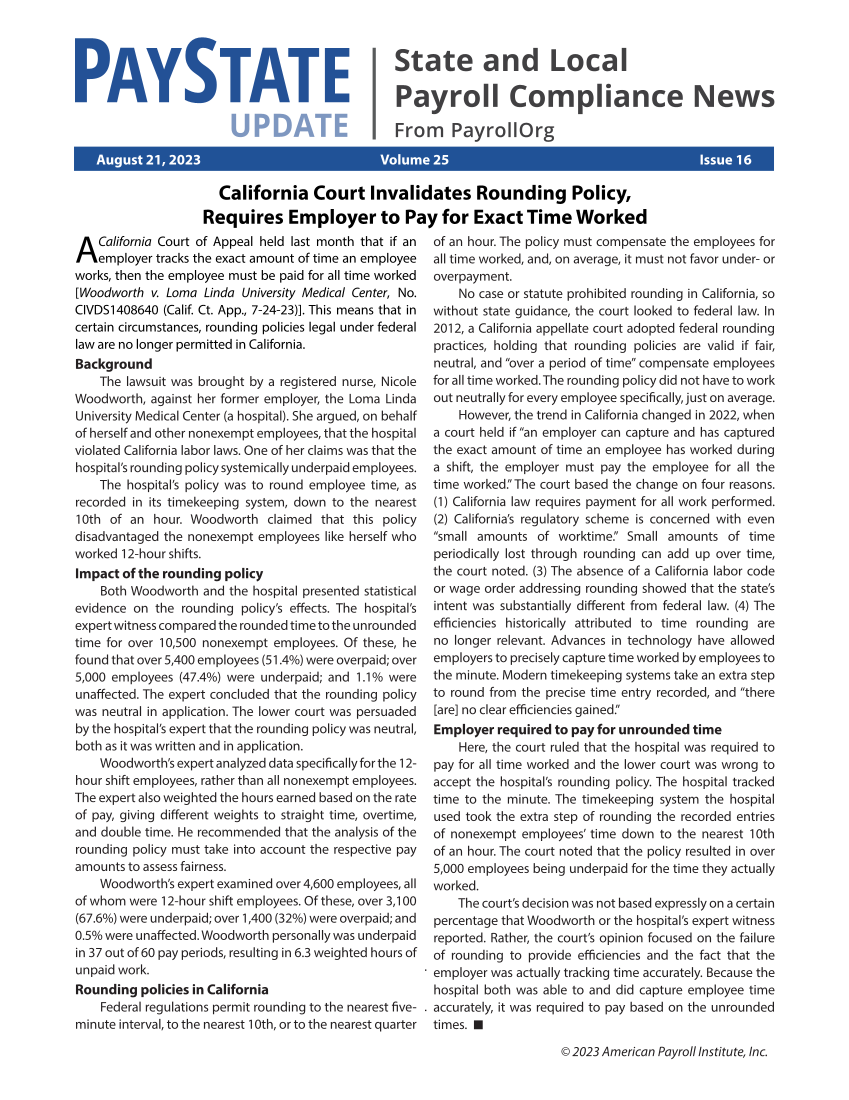© 2023 American Payroll Institute, Inc. California Court Invalidates Rounding Policy, Requires Employer to Pay for Exact Time Worked A California Court of Appeal held last month that if an employer tracks the exact amount of time an employee works, then the employee must be paid for all time worked [Woodworth v. Loma Linda University Medical Center, No. CIVDS1408640 (Calif. Ct. App., 7-24-23)]. This means that in certain circumstances, rounding policies legal under federal law are no longer permitted in California. Background The lawsuit was brought by a registered nurse, Nicole Woodworth, against her former employer, the Loma Linda University Medical Center (a hospital). She argued, on behalf of herself and other nonexempt employees, that the hospital violated California labor laws. One of her claims was that the hospital’s rounding policy systemically underpaid employees. The hospital’s policy was to round employee time, as recorded in its timekeeping system, down to the nearest 10th of an hour. Woodworth claimed that this policy disadvantaged the nonexempt employees like herself who worked 12-hour shifts. Impact of the rounding policy Both Woodworth and the hospital presented statistical evidence on the rounding policy’s effects. The hospital’s expert witness compared the rounded time to the unrounded time for over 10,500 nonexempt employees. Of these, he found that over 5,400 employees (51.4%) were overpaid over 5,000 employees (47.4%) were underpaid and 1.1% were unaffected. The expert concluded that the rounding policy was neutral in application. The lower court was persuaded by the hospital’s expert that the rounding policy was neutral, both as it was written and in application. Woodworth’s expert analyzed data specifically for the 12- hour shift employees, rather than all nonexempt employees. The expert also weighted the hours earned based on the rate of pay, giving different weights to straight time, overtime, and double time. He recommended that the analysis of the rounding policy must take into account the respective pay amounts to assess fairness. Woodworth’s expert examined over 4,600 employees, all of whom were 12-hour shift employees. Of these, over 3,100 (67.6%) were underpaid over 1,400 (32%) were overpaid and 0.5% were unaffected. Woodworth personally was underpaid in 37 out of 60 pay periods, resulting in 6.3 weighted hours of unpaid work. Rounding policies in California Federal regulations permit rounding to the nearest five- minute interval, to the nearest 10th, or to the nearest quarter of an hour. The policy must compensate the employees for all time worked, and, on average, it must not favor under- or overpayment. No case or statute prohibited rounding in California, so without state guidance, the court looked to federal law. In 2012, a California appellate court adopted federal rounding practices, holding that rounding policies are valid if fair, neutral, and “over a period of time” compensate employees for all time worked. The rounding policy did not have to work out neutrally for every employee specifically, just on average. However, the trend in California changed in 2022, when a court held if “an employer can capture and has captured the exact amount of time an employee has worked during a shift, the employer must pay the employee for all the time worked.” The court based the change on four reasons. (1) California law requires payment for all work performed. (2) California’s regulatory scheme is concerned with even “small amounts of worktime.” Small amounts of time periodically lost through rounding can add up over time, the court noted. (3) The absence of a California labor code or wage order addressing rounding showed that the state’s intent was substantially different from federal law. (4) The efficiencies historically attributed to time rounding are no longer relevant. Advances in technology have allowed employers to precisely capture time worked by employees to the minute. Modern timekeeping systems take an extra step to round from the precise time entry recorded, and “there [are] no clear efficiencies gained.” Employer required to pay for unrounded time Here, the court ruled that the hospital was required to pay for all time worked and the lower court was wrong to accept the hospital’s rounding policy. The hospital tracked time to the minute. The timekeeping system the hospital used took the extra step of rounding the recorded entries of nonexempt employees’ time down to the nearest 10th of an hour. The court noted that the policy resulted in over 5,000 employees being underpaid for the time they actually worked. The court’s decision was not based expressly on a certain percentage that Woodworth or the hospital’s expert witness reported. Rather, the court’s opinion focused on the failure of rounding to provide efficiencies and the fact that the employer was actually tracking time accurately. Because the hospital both was able to and did capture employee time accurately, it was required to pay based on the unrounded times. August 21, 2023 Volume 25 Issue 16
Printed for: PayrollOrg Bookshelf © 2024 American Payroll Institute, Inc. All Rights reserved. From: PayrollOrg Digital Publications (bookshelf.payroll.org)






